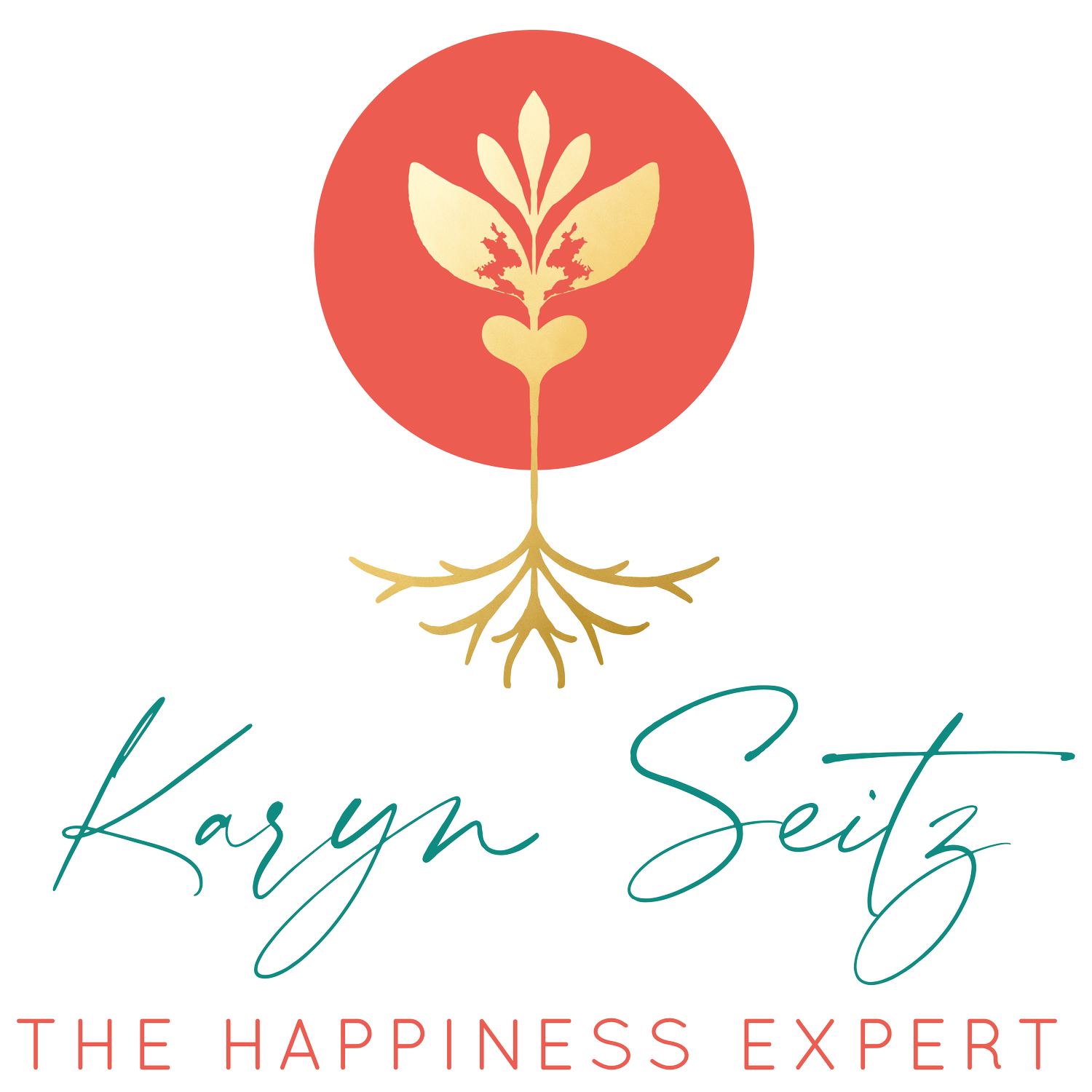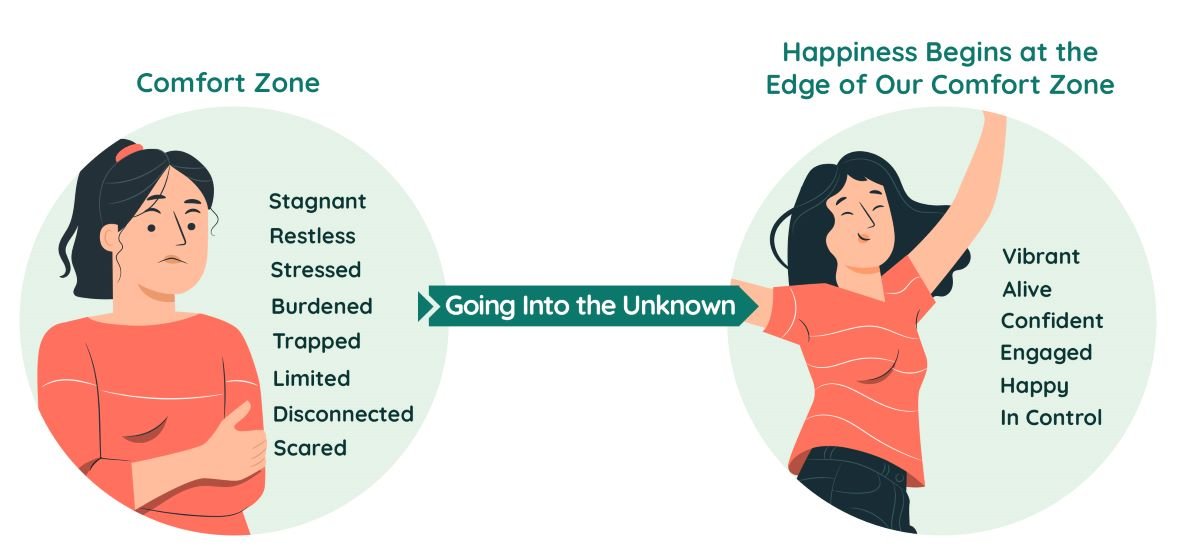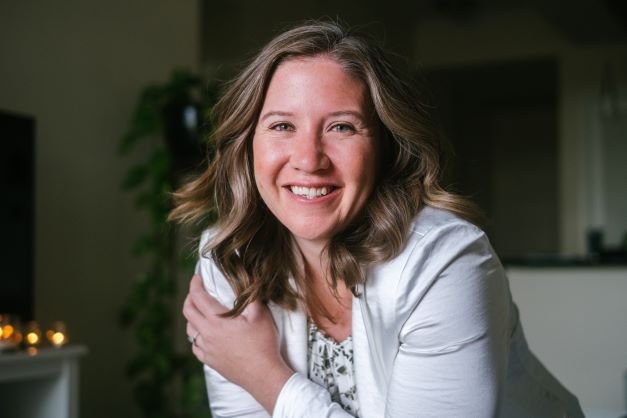How to Get Out of Your Comfort Zone: The Real Story
As I am writing and reflecting on what my life was like living in my comfort zone, I’m having what I call an “oh sh*t” moment.
As a former seeker, I realized my whole spiritual journey was a giant comfort zone. It was a way to make it look like I was doing something with my life when, really, I was doing nothing – I was self-destructing on the inside.
My spiritual journey, like all comfort zones, was a way to tightly protect myself from life.
Secretly, I felt constantly on guard. I had a severely limited experience of myself. I felt snuffed out of my life. I had no motivation to pursue or even know what I truly wanted. I watched my life go by and was missing out on the best parts of me.
Now, I know my experience is how we all feel inside any comfort zone we create in life.
So, today I want to share what I’ve learned about comfort zones and how to get out of them so you can be happy, vibrant, and engaged with life.
Let’s dive in.
What Is a Comfort Zone?
A comfort zone is anything the mind creates that protects us from the unknown in life.
I think of a comfort zone as a bubble we unconsciously create in different areas of our lives out of our fear of the unknown.
The phrase “comfort zone” is really a misnomer because being inside our comfort zone isn’t comfortable.
Comfort, in this case, means making things known and predictable.
Instead of feeling stress-free, calm, and relaxed as the word “comfort” implies, inside our comfort zone, we feel:
Limited
Trapped
Stagnant
Unsafe
Fearful
Burdened
Disconnected
We also experience a lot of anxiety because we're holding our breath for the unexpected to come our way and disrupt our bubble. Our comfort zone causes us to grasp tightly to life, trying to control anything “bad” from happening to us.
Not exactly comfortable, right?
Now that we’re on the same page about what a comfort zone is let's look at some examples.
Examples of Comfort Zones
First, I want to give three easily identifiable examples to help us understand comfort zones.
1) Staying in an Abusive Relationship
The first example is staying in an abusive or toxic relationship that we know is unhealthy. It has become a comfort zone because we know what to expect, and it's predictable.
We’re scared to leave because we don’t know what we’d have to face. It feels “easier” to stay because we can predict and anticipate the relationship, whereas leaving would put us into the unknown.
2) Staying in a Toxic Work Environment
Another excellent example of a comfort zone is staying at a job with a toxic work environment. Again, we stay because we’ve unconsciously created a bubble to protect us from the unknown. Even though we’re in a toxic work environment, it’s known and predictable.
Our mind convinces us that we’d face terrible things if we left and got a new job with a healthy environment.
Of course, this makes no sense, but in our comfort zone, we convince ourselves to cling to the false sense of protection and “safety” where we can anticipate what will happen.
3) Avoiding the Issues in a Marriage
The third example is avoiding dealing with the issues in a marriage. We don't want to rock the boat by confronting the problems because we are terrified of what could happen. So, we stay in our comfort zone of sweeping the issues under the rug to avoid any conflict.
We’re scared that the marriage might not work out if we face the problems. Then, we’d pushed out into the unknown out of starting over.
Hopefully, these examples help you connect the dots about comfort zones and why they’re not comfortable. They are simply a haven from the unknowns in life.
Let’s explore other examples to help you see the myriad of ways we unknowingly create comfort zones in our lives.
Other Types of Comfort Zones
As you read through this list, see if you can relate to any of these for yourself and understand why they are comfort zones – anything the mind creates to protect us from the unknown. Then I'll share which ones I relate to in my own life.
Being thin
Being overweight
Staying at a high-paying job we hate
Holding onto friends you’ve outgrown
Never leaving the house without makeup on
Driving a large SUV to feel safe on the road
Having a chronic illness
Wallowing in the death of a loved one
Staying in debt
Keeping the same hairstyle
Never moving from your hometown
I relate most to using being overweight as a comfort zone in my life. I've done a lot of work on myself to see that when I have extra weight on, it’s a way for me to hide from life. I’ve learned that I can use my weight as an excuse to get out of just about anything and protect myself from the unknown.
I also relate to keeping friends I've outgrown because I'm scared to rock the boat and let the relationships go.
Another comfort zone I have is keeping the same hairstyle. About a month ago, I started to realize that I would like my hair shorter after wearing it long for many years now. I had a haircut scheduled with a short hairstyle picked out, but I completely chickened out at the last minute!
I’m sharing my experiences to help you know that comfort zones are a normal part of our human experience. Identifying them is the first step to breaking through our bubbles to experience ourselves and life fully.
The next step is understanding why we create comfort zones.
Why Do We Create Comfort Zones?
Protecting ourselves from being exposed in life is the biggest reason we create comfort zones – they are a way to feel like we are in control.
When we live in a self-created bubble, it allows us to go unnoticed in life. We never have to expose our shortcomings, flaws, and limitations that would push us to grow and change.
Pushing ourselves outside our comfort zone to be exposed puts us at risk of failing and experiencing our uncomfortable feelings of less than, unimportant, rejection, and not enough.
As humans, we are terrified of failing.
I am terrified of failing as a woman because I don’t want to be exposed as wrong. In my experience, I have learned that I will do anything to avoid being wrong.
In working primarily with women, my experience is typical. As women, the worst thing we can imagine is failing and being exposed as wrong – we essentially associate being wrong with a sense of annihilation of who we are.
In our comfort zones, we perfectly curate our lives and self-image to make it look like we have it all put together. From this place, we never have to risk failing or being exposed to the limitations we need to work on in ourselves – that we don’t have it all figured out. << Learn more about the different facades we wear in this article, How to Be a Badass Woman: The Real Story>>
We desperately protect ourselves from being exposed because of what we would have to face in ourselves and how others might perceive us.
We want to realize that the willingness to risk being exposed by pushing ourselves outside our comfort zone is how we grow and learn to overcome our limitations. We feel alive and good about ourselves when we are vulnerable and risk failing and being exposed.
Let’s dive deeper into why comfort zones are not good for you.
Why Are Comfort Zones Not Good for You?
In doing research for this article, I looked through different resources from experts in the fields of psychology, mental health, and personal growth. I was surprised by how many experts regard comfort zones as a good thing – that it’s necessary to retreat to our comfort zone to recharge, feel safe, and take a break from life. <<Read More About This Misleading Perspective Here>>
Let me be clear:
Being inside our comfort zone is never good for us. It does not recharge us or eliminate stress – comfort zones drain us and exacerbate stress.
It is normal human behavior to go into our comfort zone, but please don’t live under the false impression that comfort zones are healthy for us in our lives.
The Real Story on Comfort Zones
Comfort zones are completely destructive to our sense of self.
Because comfort zones are limiting by nature, they destroy our sense of well-being and our ability to be happy.
Let's unpack five reasons why comfort zones are not good for us.
1) Comfort Zones Cause Us to Live in Fear
The more we live in a comfort zone, the more fearful we become and believe the world is a scary, bad place. We don't realize that living in a comfort zone is what makes us feel unsafe.
In a comfort zone, we live in an illusion of fear created by the mind and live in our stories of how unsafe the world is – this illusion is how we convince ourselves to stay in our bubble and avoid the unknown.
2) Comfort Zones Cause Us to Hide and Play Small
We never get to know our potential when we hide inside our self-created bubble.
I can't tell you how many women I've spoken to over the years who are frustrated and disappointed with themselves for not living up to their potential. I was one of them.
To know and express our potential, we must be willing to risk failing and being exposed so we can discover who we are – hiding and playing small by living in a comfort zone makes that impossible.
3) Life Feels Redundant, Stagnant, and Boring in a Comfort Zone
Living in a comfort zone makes us feel stifled and stuck in life.
We mistakenly think our relationships, roles, and responsibilities make us feel this way. Speaking from my own experience, if we’re married, we begin to think it's our marriage or spouse that makes us feel stuck and bored.
Being disengaged from life is what causes us to feel stagnant because living inside a comfort zone becomes very depressing.
Ultimately, we begin to feel like life has no meaning and purpose.
4) We Never Get to Explore Life When We Live in a Comfort Zone
In a comfort zone, we never learn the beauty of life and the possibilities available to us.
Because we're so busy protecting ourselves from life, we shut ourselves off from new opportunities and experiences that would allow us to grow and change.
We blind ourselves from the positive experiences we can have in life by pushing ourselves out into the unknown.
5) We Never Get to Know Who We Are When We Live in a Comfort Zone
We use comfort zones to protect ourselves from getting to know who we are.
Even though we often say we want to know ourselves, we’re scared to learn about who we are:
Where will knowing myself take me?
What will I have to do?
What direction will my life go?
Protecting ourselves from knowing who we are means we never learn to trust and believe in ourselves.
When we leave our comfort zone, we realize we can trust ourselves to handle and navigate life. We learn to believe in ourselves.
Knowing that a comfort zone isn’t good for us, how do we get out of it?
How to Get Out of Our Comfort Zone
Getting out of our comfort zone is simple. It's not complicated or scary like we make it out to be in our minds.
Getting outside our comfort zone is similar to how we feel on the first day of school or a new job. The fear we create about these experiences is just an illusion the mind creates - it's not real, and nothing we tell ourselves actually happens.
There is a great acronym for fear:
False
Evidence
Appearing
Real
Our minds are very convincing of all the terrible things that will happen when we step into the unknown. However, once we break through the bubble, we discover an amazing life full of possibilities.
All it takes is a choice.
Getting Out of Our Comfort Zone is A Simple Choice
To get out of our comfort zone, we must choose who we want to be and how we want to know ourselves.
It's a simple choice that we all have the ability to make.
To get out of my comfort zone, I had to ask myself:
How do I want to know myself?
How do I want to experience myself in life?
Who do I want to be for me?
I couldn’t make the choice for how others would perceive me or what I thought I “should” do. I had to choose for myself – I could either continue to hide and play small or live fully and do my best so I can know who I am and believe in myself.
I knew that if I stayed scared of life and played small, I would end up on my deathbed in regret. I would look back, wishing I had pushed myself beyond my fears and limitations.
I have decided that’s not who I want to be or how I want to live my life.
I want to know myself as someone who strives to discover my potential and feel good about myself. I want to face my limitations and fears – that way, no matter how my life turns, what I accomplish or don’t, I will know I lived outside my comfort zone and did the best I could. I will have no regrets at the end of my life.
We all have the same choice.
Do we want to live in fear, playing small and never getting to know ourselves? Or do we want to face our fears to break through our limitations into the world of possibilities?
Once we choose to live outside our comfort zones, it's just a lifestyle change to make conscious choices to push and stretch ourselves in life to get to know who we are.
Now we know that getting outside our comfort zones is simple – it’s just a choice of who we want to know ourselves as and then following through to make the lifestyle change to get outside our bubble.
Finally, let’s explore the correlation between happiness and comfort zones.
Why We Can’t Be Happy Living in a Comfort Zone
It is impossible to be happy living inside a comfort zone.
Happiness is something we have to create by making choices in life that make us feel good about who we are.
As we’ve been learning, comfort zones limit us and cause us to live in fear. In our fear, we naturally choose to take the easy way in life, making us feel bad about ourselves. These choices continue to foster fear, and we never learn to trust ourselves or life.
Simply put, comfort zones work against us from being happy because we don’t feel good about ourselves living in a comfort zone. Somewhere in us, we know we're hiding, playing small, and holding ourselves back, which makes us feel insecure, not enough, and unimportant.
To be happy, we must be aware of our comfort zones and consciously desire to break through them.
Remember, getting outside your comfort zone isn’t scary. It's fun.
Living outside our comfort zone makes us feel alive, engaged, and confident. We trust ourselves and no longer feel stagnant and trapped.
Bottom line?
Happiness begins at the edge of our comfort zone.
Getting outside our comfort zone is the journey of being happy – it is how we build self-worth so that we feel good about who we are.
Final Thoughts: How to Get Out of Your Comfort Zone
In wrapping up, I hope you have a new depth of understanding about the destructive nature of comfort zones and how to get out of them to know who you are and believe in yourself.
Living in my comfort zone was the very reason I was so unhappy in my life. I put so much energy into protecting myself and carefully dodging life that I didn’t realize how much I was missing out on.
By making conscious choices to break through my limitations and grow into my potential, I am happy and feel good about myself.
You have the same choice to live a life free from your limitations by getting outside your comfort zone so you can be happy too.
Now, I would love to hear from you. What was your biggest ‘a-ha’ moment or takeaway from this article? What struggles have you had living in your comfort zone? Do you have any questions or topics you would like me to cover next? Let me know in the comments section below.
Also, if you found this article meaningful and helpful, please share it with a friend or on your social media accounts.
Interested in Working with Me?
If you're ready to break through your comfort zone so you can live up to your fullest potential and be vibrant and confident, schedule a free get-to-know-you call with me.
I'm passionate about teaching women how to be happy and know who they are in my happiness course, Awakened Grace.
I would love to get to know you and see if Awakened Grace is your next best step for where you are on your path.


